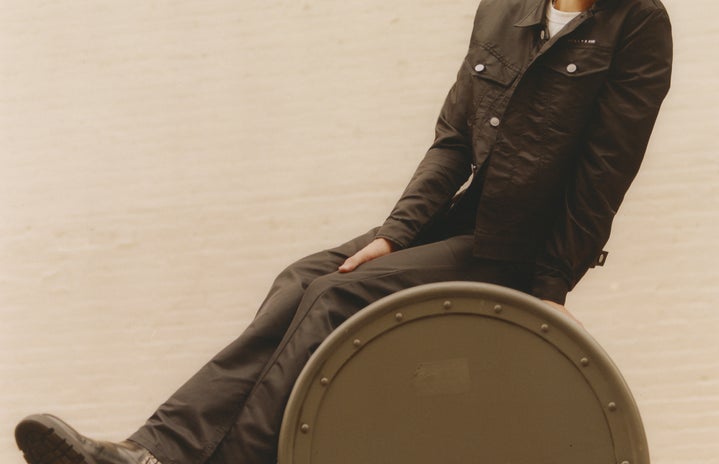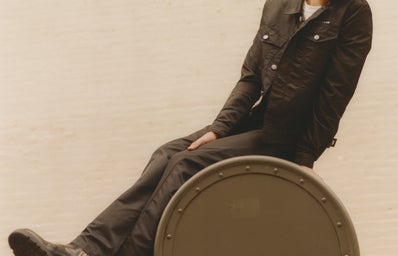After a year of Sway boys, f*ck boys, and eboys, Joshua Bassett may be just what the doctor ordered.
In a June interview with GQ, the 20-year-old actor and singer spoke not only about his recent rise to the success of hit show High School Musical The Musical: The Series and the media-induced drama surrounding Olivia Rodrigo’s song “drivers license,” but he also displayed his soft boi side: a side that keeps bringing his fans in. Last year, a fan on Twitter wrote, “@joshuatbassett is the blueprint for all the soft boi fictional characters I fell in love w/ in my YA books, except HE IS REAL and I can actually HEAR HIM BEAUTIFULLY SING NOT JUST READ THAT HE CAN LOL #AnyoneElseOutNow.”
According to The Guardian, a “soft boi” is a lot like what it sounds like: boys who usually have alternative interests and who aren’t afraid to show their emotions. Some say that the popularity of the soft boi emerged from popular male K-pop artists who altered the way masculinity is perceived in South Korea, appealing to “soft masculinity.” There is also the Hollywood soft boi, which is perhaps the term that Bassett falls best under, along with celebrities such as Harry Styles, Lucas Hedges, Tom Holland, and Timothée Chalamet.
Bassett is a breath of fresh air among his male celebrity counterparts who boast toxic masculinity and perpetuate harmful stigmas surrounding emotions in boys.
The trending emergence of the soft boi breaks the norm of TikTok Sway boys, f*ck boys, and eboys who have roamed and controlled the internet for much too long. While these categories of men are infamously known for suppressing their feelings and flaunting their masculinity like a coat of armor, soft bois demonstrate that men can have feelings, too — and moreover, that they most certainly shouldn’t be ashamed of showing them.
In other words, Bassett is a breath of fresh air among his male celebrity counterparts who boast toxic masculinity and perpetuate harmful stigmas surrounding emotions in boys. (For instance, I don’t think Bryce Hall would voluntarily post a video of himself crying about how much he loves his co-stars like Bassett has.)
Similar to how Styles rocked a so-called “feminine” dress on his 2020 Vogue cover, Bassett shared that he frequently wore a Snow White costume when he was a kid. He told GQ that he was always surrounded by feminine energy in his household, having five sisters. Soft bois like Styles and Bassett demonstrate that clothing — such as a princess dress, for instance — are not restricted to a particular gender.
Soft bois demonstrate that men can have feelings, too — and moreover, that they most certainly shouldn’t be ashamed of showing them.
In his interview, Bassett also spoke about his emotional side and how he always felt that he had to hide that part of himself as a child, telling GQ, “I was a very emotional kid. I was constantly yelled at for crying. I would spend every night being like, Don’t cry, don’t cry, don’t cry. I remember beating myself up every night.” But perhaps Bassett wasn’t an emotional kid — maybe he was just… normal. According to a 2014 study published by Judy Y. Chu, kindergarten-aged children initially have the same capacity for empathy, regardless of gender. However, because girls are taught to show their emotions and practice empathy throughout childhood, boys are often taught to keep these feelings bottled up because of societal norms, and are thus unable to empathize and reveal their emotions as well as girls can — even as they become older.
Bassett’s approach to addressing the Rodrigo and Sabrina Carpenter drama that emerged with Rodrigo’s release of “drivers license” also wowed fans. Throughout the peak of the love triangle drama back in January, Bassett remained quiet, and it was later revealed that he was actually in the hospital experiencing “the worst pain in [his] life” amid the alleged feud. However, Bassett showed nothing but support for both Rodrigo and Carpenter, saying to GQ, “[Everyone] is asking me about Sabrina and Olivia. Why don’t we focus on these women for who they are? Let’s focus on the art that they’re making and how great they are instead of their relationship to a boy.” Yes, Bassett, let’s get rid of that harmful “other woman” trope!
Bassett also got very real about his sexuality in his interview, tearily telling GQ, “I just hope that this generation can feel comfortable, confident, and safe talking about sexuality without needing to be a box and without needing to have it all figured out. It makes me emotional. I didn’t necessarily have that when I was younger. I didn’t have a me saying stuff like this. I’m very at peace. I’m celebrating Pride all month long.”
At its core, soft boi culture is a deviance from the norm of toxic masculinity in men: a norm that has been present in American culture for centuries.
Bassett’s authenticity and openness in his interview, and his overall embodiment of the classic soft boi, definitely resonated with fans. One fan wrote on Twitter, “it’s the way joshua bassett opened up about how his condition was bad and the gp [general public] wishing him hate, but still continued to check up on his fans, spread positivity and openly support olivia and sabrina. my goodness we don’t deserve joshua 😭.”
But we — and especially young boys and men — do deserve Joshua. Without soft bois like Bassett, there would be no push for cultural change when it comes to gender stereotypes. At its core, soft boi culture is a deviance from the norm of toxic masculinity in men: a norm that has been present in American culture for centuries. The culture envelops the notion that femininity is not equated with weakness, and that gender, in essence, is merely a social construct. Although there are certain norms and behaviors that are associated with different genders, it does not mean that people need to adhere to these standards. If anything, breaking the status quo is a good thing and can lead to positive societal change; in this case, a change surrounding the perceptions of masculinity and femininity and breaking down toxic masculinity.
So, there’s the case: Joshua Bassett is the new face of soft boi culture, and I’m sure there will be more celebrities like him who will follow suit. Not only does Bassett’s soft boi side appeal to his fans, but it also shows young boys and men that it is okay to show your emotions — and that it’s actually cool to cry.
Studies Referenced:
Chu, J.Y. (2014). When Boys Become Boys: Development, Relationships, and Masculinity. NYU Press.


